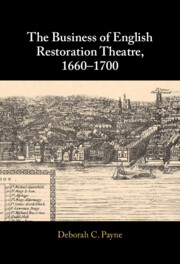Refine search
Actions for selected content:
2 results

The Business of English Restoration Theatre, 1660–1700
-
- Published online:
- 18 October 2024
- Print publication:
- 13 June 2024
-
- Book
-
- You have access
- Open access
- Export citation
Chapter 1 - The Theatre as Gift
-
- Book:
- The Business of English Restoration Theatre, 1660–1700
- Published online:
- 18 October 2024
- Print publication:
- 13 June 2024, pp 16-66
-
- Chapter
-
- You have access
- Open access
- HTML
- Export citation
